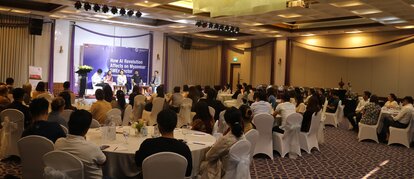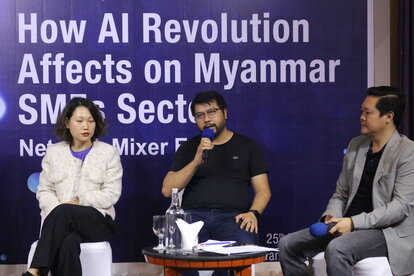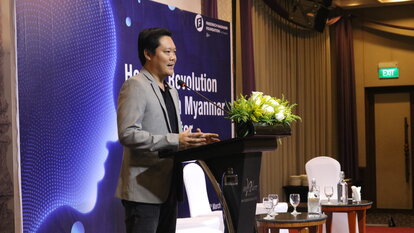AI and SMEs
AI: Challenges and opportunities for SMEs

From left to right: 1) Kyaw Zin Hted, Co-founder & Managing Director, Rangoon Tech, 2) Sharr Thet Zaw, Founder & CEO of Sharrtz Organization Myanmar, 3) Wit Yee Chan, Founder & CEO of AnyRev, 4) Myo Mya Swe Tun @Micheal, President of DIKA Group, and 5) Okka Myo, Co-founder & Managing Director of Impact Hub Yangon
AI is increasingly being used in businesses worldwide, including Myanmar. As AI continues to become a leading technology trend, businesses in Myanmar are recognising the importance of incorporating it into their operations, while at the same time, being cognizant of its potential drawbacks coming along with its advantages from different ways of applications.
On March 25, 2023, to start the dialogue and discussion on AI trends among SMEs in Myanmar, Impact Hub Yangon and FNF Myanmar hosted an event entitled "How AI Revolution Affects the Myanmar SME Sector". The event consisted of a panel discussion by four CEOs and tech startups, followed by a group discussion among SME owners and business executives. The event concluded with a short online survey to gauge the opinions of participants joining the event.

SMEs, entrepreneurs and startups from FNF Myanmar & Impact Hub Yangon attending the event
What are the benefits of AI technology for SMEs in Myanmar?
At the event, the panelists - who have both tech backgrounds and currently running their own businesses - discussed the impacts of AI on SMEs and the potential developments in the future, as well as the potential benefits that AI could bring to businesses.
According to one of the panelists, Ms. Wutyi Chen, Founder & CEO of AnyRev TV, AI technology could have tremendous benefits for SMEs if they are open-minded to AI trends and incorporate its tools into their operations wisely. The utilization of AI can not only improve efficiency and increase sales, but it can also reduce operational costs due to the variety of resources it can provide without the need for experts.
Mr. Myo Mya Swe Than, President of DIKA Consulting Group, also shared the impressive capabilities of AI, highlighting how it could generate a more professional contract than the ones they used to create for their clients.
"AI is not a new concept; we engage with it on a daily basis through apps, social media, and many other platforms. The recent launch of ChatGPT, an AI-generated Chabot, has attracted millions of users within weeks, and it is expected to be a great asset to the SME sector as well," said Okka Myo, Founder of Impact Hub Yangon.

From left to right: 1) Wit Yee Chan, Founder & CEO of AnyRev, 2) Myo Mya Swe Tun @Micheal, President of DIKA Group, and 3) Okka Myo, Co-founder & Managing Director of Impact Hub Yangon
How do SMEs in Myanmar perceive the challenges or threats posed by AI?
While uncertainty remains around how the technology will progress, SME owners are aware that it could have an impact on human self-esteem. Okka Myo from Impact Hub Yangon explained that with AI tools such as Chat-GPT becoming more commonly used, this could lead to a loss of self-esteem as AI is often perceived as more perfect and complete than Human works. He urged that it is important to acknowledge and sustain the value of authentic works of humans.
According to the survey results run at the end of the event, 75% of all attendees have started using ChatGPT, and surprisingly 100% of them agreed that the AI revolution brings promising opportunities for their personal life and their profession as well. Given the threats discussed during the panel and group discussion, 74% acknowledged the necessity of strict government regulation on AI usage in Myanmar. One of the panelists also added her concern that policy makers in general around the world are still behind in developing mechanisms to regulate AI, which could create unnecessary harms to humans.
One of the panelist, Ms Sharr Thet Zaw, Founder & CEO of Sharrtz Organization Myanmar, gave an example of the limitations of AI, “for example, ChatGPT can draft business model and proposals, but the data released from AI are limited, lack of source, and so not always 100% accurate. Additionally, there are also drawbacks to using AI that business owners should be aware of, such as copyright issues that agencies need to consider, and graphic designers may point out questions about AI designs”.
The panelists also discussed how the data released by AI is often not tailored specifically to Myanmar or the public as Myanmar does not have relevant and up-to-date data available. The panelists offered advice to SME owners to be mindful of the risks that come along with using AI for their businesses. They suggested preparing for certain sectors that could potentially be lost due to the development of AI.
Using AI in an Ethical way
The use of AI technology has raised ethical questions around the world. Policy makers must be mindful of the ethical issues surrounding AI and how it can be regulated. Despite the advancements of AI, it is important to remain cautious and consider the potential implications of its use.
The panelists discussed the ethical implications of using AI technology in daily business operations. They highlighted the need for companies and organizations to develop internal policies to define the level/limit of acceptance, adaptation, and integration of AI tools.
Additionally, Kyaw Zin Htet, Co-founder & Managing Director of Rangoon Tech spoke about the importance of having the ability to define what to extract from AI generated information and products and how to customize them for their specific wants and needs, and ensuring that AI technology adheres to ethical values and standards. He also emphasized the need to train staff and employees to proactively adapt to AI tools.
Myo Mya Swe Than further commented, "As AI technology will be utilized more in the future, it is essential that we prepare for ethical use and also consider not charging clients fees for usage of AI-generated contracts."
Finally, they concluded that AI technology should be used to enhance human performance, not replace it.
As AI technology becomes increasingly essential in our society, it brings both benefits and challenges. The panellists discussed the possible displacement of millions of jobs and the creation of new ones that AI could bring in the future. Their views and perspectives on AI offered insights into the potential implications of its use especially for the SME sector.
More Photos

Biak Hlei Sung is the executive program manager for the Economic Freedom Program of FNF Myanmar Office.

Participants mingling with one of the panelists

Okka Myo, Co-founder & Managing Director of Impact Hub Yangon, delivering a welcome remark

Participant raising a question on ethical perspectives on AI
Launching Land of Growth Card Game to Myanmar Audience

In an exciting development for fans of business and economics, the Friedrich Naumann Foundation Myanmar Office launched a new market economy card game on 27th January 2023. The game, called "Land of Growth", is developed by the FNF Thailand Office to stimulate a complex market economy in a user-friendly and engaging way. They also need to adapt to changing market conditions, such as fluctuations in demand and supply, and respond to the actions of other players.